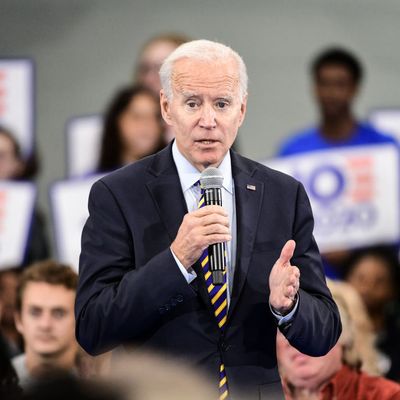
Democratic front-runner Joe Biden surely has an abundant list of concerns as he chases down the nomination: An ascendant small-town mayor at the top of the polls in Iowa, an underrated Sanders campaign, and the GOP plan to stymie the impeachment process with allegations of Biden family corruption could be chief among them. But on Friday, as part of his eight-day No Malarkey tour of Iowa, the former vice-president expressed an unexpected 2020 anxiety.
Describing his plan to “work things out” with Senator Lindsey Graham to pass legislation if elected, Biden shared his worry that the Republican Party could suffer too great a loss in 2020, wondering what would happen if the GOP got “clobbered” in November and Democrats were able to genuinely wield power for the first time in a decade.
“I’m really worried that no party should have too much power,” he told a crowd in Decorah, according to BuzzFeed News. “You need a countervailing force.” That idea is a hallmark of independent voters splitting their ticket in pursuit of so-called checks and balances on the party in power. But as New York’s Ed Kilgore notes, that impulse can “produce the very abuses of power they claim to fear.”
Perpetually divided government (which we have had more often than not at the federal level in the post–World War II era) is an invitation to gridlock, dysfunction, and citizen dissatisfaction. It’s even more damaging now that the ideological polarization of the two major parties has made bipartisan coalitions vastly less likely than in the days when liberal Republicans and conservative Democrats walked the Earth. Yet some of the same voters who consider themselves shrewd and civic-minded for keeping the two parties in balance tend to complain about stuff not getting done.
Biden also said that he anticipated “serious consequences” for the GOP once Trump is out of office, as Americans come to terms with the damages that he done to the GOP. This assessment suggests that Biden may not have been closely observing the impeachment hearings, where prominent Republicans doubled down on the conspiratorial rhetoric forwarded by the president and his favorite television station.
Despite this foretold reckoning, he added that he did not expect Republican voters to come to “some great epiphany” — although he said in November that he expected that “a number of my colleagues have an epiphany” after Trump leaves the White House. For all those GOP voters who would not see the blue light, he offered some interesting advice: “If you hear people on the rope line saying, ‘I’m a Republican,’ I say, ‘Stay a Republican.’ Vote for me but stay a Republican, because we need a Republican Party.”
The comment is descriptive of a larger conflict within Biden’s messaging. Throughout the primary, the former vice-president has invoked politics-before-Trump as a highly functioning, civil process — though the civility was shared with segregationists and the road to progress he travelled with President Obama was laden with obstacles planted by the opposition party. Biden seems to suggest that if the Republican Party returns to its tenor prior to Trump, that will be the booster shot needed in American politics, overlooking that the good old Grand Old Party shut down the gears of the senate, sheltered birtherism, and blocked the nomination of Merrick Garland.






























